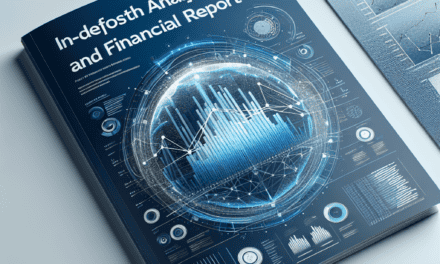“Meta and Palantir Join Forces in Defense AI: Unveiling the Next Big Investment Opportunity.”
Introduction
In the rapidly evolving landscape of defense technology, two prominent companies, Meta Platforms Inc. and Palantir Technologies Inc., have emerged as key players in the development and deployment of artificial intelligence solutions. As these tech giants collaborate to enhance defense AI capabilities, investors are keenly observing the potential financial implications of this partnership. Meta, known for its expansive social media platforms and virtual reality innovations, brings a wealth of data and machine learning expertise to the table. Meanwhile, Palantir, with its robust data analytics and intelligence software, offers a strong foundation in handling complex defense-related data. This collaboration not only signifies a strategic alignment in advancing AI-driven defense solutions but also raises the question of which company presents a more compelling investment opportunity. By examining their respective market positions, technological advancements, and financial health, investors can better assess which stock might offer greater potential for growth and returns in the burgeoning defense AI sector.
Overview Of Meta And Palantir’s Collaboration In Defense AI
In recent years, the intersection of artificial intelligence and defense has become a focal point for technological innovation, with companies like Meta and Palantir leading the charge. Their collaboration in defense AI marks a significant milestone in the evolution of military technology, promising to enhance capabilities and streamline operations. This partnership leverages Meta’s expertise in AI and machine learning with Palantir’s robust data analytics platform, creating a synergy that could redefine defense strategies. As investors evaluate the potential of this collaboration, understanding the strengths and market positions of both companies becomes crucial.
Meta, formerly known as Facebook, has long been a pioneer in AI research, investing heavily in developing algorithms that can process vast amounts of data efficiently. Its transition from a social media giant to a technology conglomerate underscores its commitment to innovation. By integrating its AI capabilities with Palantir’s data analytics, Meta aims to expand its influence beyond consumer technology into more strategic sectors like defense. This move not only diversifies Meta’s portfolio but also positions it as a key player in the defense industry, which is increasingly reliant on cutting-edge technology.
On the other hand, Palantir has established itself as a leader in data analytics, particularly within government and defense sectors. Its platforms are renowned for their ability to integrate and analyze complex datasets, providing actionable insights that are critical for decision-making in high-stakes environments. Palantir’s collaboration with Meta is a natural extension of its mission to harness data for strategic advantage. By incorporating Meta’s AI advancements, Palantir can enhance its offerings, providing more sophisticated solutions to its defense clients.
As investors consider the implications of this collaboration, they must weigh the potential benefits against the inherent risks. Meta’s foray into defense AI represents a strategic pivot that could yield substantial returns if successful. However, it also involves navigating a highly regulated industry with unique challenges. Investors must consider whether Meta’s experience in consumer technology can translate effectively into the defense sector, where the stakes are considerably higher.
Conversely, Palantir’s established presence in defense provides a level of stability and expertise that may appeal to risk-averse investors. Its collaboration with Meta could accelerate growth by expanding its technological capabilities and market reach. However, Palantir’s reliance on government contracts poses its own set of risks, particularly in terms of political and budgetary uncertainties.
In evaluating which stock offers greater investment potential, investors should consider both companies’ long-term strategies and market dynamics. Meta’s diversification into defense AI could drive significant growth, particularly if it successfully leverages its AI expertise to gain a competitive edge. Meanwhile, Palantir’s deep-rooted connections in the defense sector and its focus on data-driven solutions provide a solid foundation for sustained growth.
Ultimately, the decision may hinge on an investor’s risk tolerance and investment horizon. Those seeking high-growth opportunities might favor Meta, given its ambitious expansion plans and potential for innovation. In contrast, investors prioritizing stability and proven expertise may find Palantir’s established track record in defense more appealing. As the collaboration between Meta and Palantir unfolds, it will undoubtedly shape the future of defense AI, offering intriguing possibilities for both companies and their investors.
Analyzing The Financial Health Of Meta And Palantir
In the rapidly evolving landscape of artificial intelligence, the collaboration between Meta and Palantir on defense AI has captured the attention of investors and industry analysts alike. As these two tech giants join forces, it becomes imperative to analyze their financial health to determine which stock might offer greater investment potential. Both companies have carved out significant niches in the tech industry, yet their financial trajectories and business models differ markedly, offering distinct opportunities and risks for investors.
Meta, formerly known as Facebook, has long been a dominant force in the social media and digital advertising sectors. Its robust revenue streams are primarily driven by advertising, which has allowed the company to amass substantial cash reserves. This financial strength provides Meta with the flexibility to invest heavily in research and development, particularly in AI and virtual reality, as it seeks to diversify its revenue sources. Moreover, Meta’s strategic pivot towards the metaverse represents a bold vision for the future, albeit one fraught with uncertainty. While this ambition could yield significant long-term rewards, it also requires considerable upfront investment, which may impact short-term profitability.
In contrast, Palantir operates within a more specialized domain, focusing on data analytics and software solutions for government and commercial clients. The company’s financial health is underpinned by its strong relationships with government agencies, which provide a stable revenue base. Palantir’s business model emphasizes long-term contracts, ensuring a degree of revenue predictability that is appealing to risk-averse investors. However, Palantir’s reliance on government contracts also exposes it to potential regulatory and political risks, which could affect its financial performance.
When evaluating the financial health of these companies, it is essential to consider their respective growth prospects. Meta’s vast user base and advertising prowess position it well for continued revenue growth, particularly as it expands into new markets and technologies. However, the company faces increasing regulatory scrutiny and competition, which could pose challenges to its growth trajectory. On the other hand, Palantir’s focus on data-driven solutions aligns well with the growing demand for advanced analytics across various sectors. The company’s ability to innovate and adapt its offerings to meet evolving client needs will be crucial in sustaining its growth momentum.
Another critical aspect to consider is the companies’ profitability and cash flow. Meta’s established business model has historically generated strong profit margins, providing a cushion for its ambitious investments in new technologies. In contrast, Palantir’s profitability has been more variable, reflecting its ongoing investments in product development and market expansion. While Palantir has made strides in improving its operational efficiency, achieving consistent profitability remains a key challenge.
In conclusion, both Meta and Palantir present compelling investment opportunities, albeit with different risk-reward profiles. Meta’s financial health is characterized by its strong cash flow and market dominance, offering potential for long-term growth as it ventures into new technological frontiers. Meanwhile, Palantir’s focus on data analytics and its stable government contracts provide a solid foundation for growth, albeit with inherent risks. Investors must weigh these factors carefully, considering their own risk tolerance and investment horizon, to determine which stock aligns best with their financial goals. As the collaboration between Meta and Palantir unfolds, it will be intriguing to observe how their financial strategies evolve in response to the dynamic AI landscape.
Market Trends Impacting Meta And Palantir’s Stock Performance
In recent years, the intersection of technology and defense has become a focal point for investors seeking to capitalize on the burgeoning field of artificial intelligence (AI). The collaboration between Meta Platforms, Inc. and Palantir Technologies Inc. in the realm of defense AI has sparked considerable interest, prompting analysts and investors alike to scrutinize the potential market trends that could impact the stock performance of these two tech giants. As the defense sector increasingly integrates AI into its operations, understanding the market dynamics influencing Meta and Palantir’s stock performance becomes crucial for making informed investment decisions.
To begin with, Meta, formerly known as Facebook, has been primarily recognized for its dominance in social media and digital advertising. However, its foray into AI, particularly in collaboration with Palantir, marks a strategic pivot towards diversifying its technological portfolio. This move aligns with Meta’s broader vision of expanding its influence beyond social media into areas such as virtual reality and AI-driven solutions. Consequently, investors are keenly observing how this diversification strategy might bolster Meta’s stock performance, especially as the company seeks to mitigate risks associated with its core advertising business.
On the other hand, Palantir has long been associated with providing data analytics solutions to government and defense sectors. Its expertise in handling complex data sets and delivering actionable insights has positioned it as a key player in the defense AI landscape. The collaboration with Meta is expected to enhance Palantir’s capabilities by leveraging Meta’s advanced AI technologies, potentially leading to more sophisticated and effective defense solutions. This partnership could serve as a catalyst for Palantir’s stock, as it underscores the company’s commitment to innovation and its ability to forge strategic alliances with industry leaders.
Moreover, the broader market trends impacting the defense sector cannot be overlooked. The increasing geopolitical tensions and the subsequent rise in defense budgets across various nations have created a fertile ground for AI-driven defense solutions. As governments seek to modernize their military capabilities, companies like Meta and Palantir stand to benefit from the growing demand for cutting-edge technologies. This trend is likely to have a positive impact on their stock performance, as investors anticipate increased revenue streams from defense contracts and partnerships.
However, it is essential to consider the potential risks and challenges that could influence the stock performance of both companies. Regulatory scrutiny, particularly concerning data privacy and ethical considerations in AI deployment, remains a significant concern. Both Meta and Palantir have faced criticism in the past regarding their handling of user data and privacy issues. As they venture further into the defense sector, maintaining transparency and adhering to ethical standards will be crucial in sustaining investor confidence and avoiding potential legal hurdles.
In conclusion, the collaboration between Meta and Palantir in defense AI presents a compelling opportunity for investors. While Meta’s diversification strategy and Palantir’s established presence in the defense sector offer promising prospects, the evolving market trends and regulatory landscape will play a pivotal role in shaping their stock performance. Investors must carefully weigh these factors, considering both the potential rewards and inherent risks, to determine which stock offers greater investment potential in this rapidly evolving domain. As the defense AI sector continues to grow, the strategic decisions made by Meta and Palantir will undoubtedly influence their trajectories in the stock market.
Technological Innovations From The Meta-Palantir Partnership

The collaboration between Meta Platforms, Inc. and Palantir Technologies Inc. marks a significant milestone in the realm of defense artificial intelligence (AI), as both companies bring their unique strengths to the table. Meta, known for its prowess in social media and virtual reality, has been making strides in AI research and development. Meanwhile, Palantir, a leader in data analytics and software, has established a strong foothold in the defense sector. This partnership aims to leverage Meta’s advanced AI capabilities and Palantir’s expertise in data integration and analysis to create innovative solutions for defense applications.
As the defense industry increasingly turns to AI for enhanced decision-making and operational efficiency, the Meta-Palantir collaboration is poised to deliver cutting-edge technologies that could redefine the landscape. By combining Meta’s AI research, which includes natural language processing and computer vision, with Palantir’s robust data analytics platforms, the partnership seeks to develop systems that can process vast amounts of data in real-time. This capability is crucial for defense operations, where timely and accurate information can be the difference between success and failure.
Moreover, the integration of AI into defense systems promises to enhance situational awareness, improve threat detection, and streamline logistics. For instance, AI-driven analytics can help identify patterns and anomalies in data that might indicate potential security threats. Additionally, AI can optimize resource allocation and mission planning, ensuring that defense operations are both effective and efficient. The collaboration between Meta and Palantir is expected to accelerate the development of these technologies, offering significant advantages to defense agencies worldwide.
From an investment perspective, the partnership raises intriguing questions about which company might offer greater potential for growth. Meta, with its vast resources and commitment to AI innovation, is well-positioned to capitalize on the increasing demand for AI solutions across various sectors, including defense. The company’s focus on building the metaverse also suggests a long-term vision that could yield substantial returns for investors. However, Meta’s involvement in the defense sector is relatively new, and it remains to be seen how effectively it can navigate the complexities of this industry.
On the other hand, Palantir’s established presence in the defense sector and its reputation for delivering reliable data solutions make it an attractive investment option. The company’s software is already widely used by defense agencies, and its collaboration with Meta could further solidify its position as a leader in defense AI. Palantir’s focus on government contracts provides a stable revenue stream, which could be appealing to investors seeking a more predictable return on investment.
In conclusion, the Meta-Palantir partnership represents a significant advancement in defense AI, with both companies bringing complementary strengths to the collaboration. While Meta offers the potential for groundbreaking AI innovations, Palantir provides a solid foundation in defense analytics. Investors must weigh these factors carefully, considering both the short-term and long-term prospects of each company. As the partnership unfolds, it will be crucial to monitor how effectively Meta and Palantir can integrate their technologies and deliver on their promise of transforming defense operations through AI. Ultimately, the success of this collaboration could have far-reaching implications for the defense industry and the investment landscape.
Risk Factors For Investors In Meta And Palantir
In the rapidly evolving landscape of artificial intelligence and defense technology, the collaboration between Meta Platforms Inc. and Palantir Technologies Inc. marks a significant milestone. As these two tech giants join forces to develop advanced AI solutions for defense applications, investors are keenly observing the potential risks associated with investing in either company. Understanding these risk factors is crucial for making informed investment decisions.
To begin with, Meta, formerly known as Facebook, has been a dominant player in the social media and technology sectors. However, its foray into defense AI introduces a new set of challenges. One primary risk factor for Meta is regulatory scrutiny. The company has faced significant regulatory challenges in the past, particularly concerning data privacy and antitrust issues. As Meta ventures into defense technology, it may encounter heightened scrutiny from governments and regulatory bodies, which could impact its operations and financial performance. Additionally, the defense sector is subject to stringent regulations and compliance requirements, which could pose further challenges for Meta as it navigates this complex landscape.
Moreover, Meta’s core business model relies heavily on advertising revenue, which is susceptible to economic fluctuations and changes in consumer behavior. Any downturn in advertising spending could adversely affect Meta’s financial stability, potentially limiting its ability to invest in and develop cutting-edge defense AI technologies. Furthermore, the competitive nature of the tech industry means that Meta must continuously innovate to maintain its market position. Failure to do so could result in a loss of market share to more agile competitors, thereby impacting its long-term growth prospects.
On the other hand, Palantir Technologies, known for its data analytics and software solutions, brings a wealth of experience in working with government and defense agencies. However, Palantir is not without its own set of risks. A significant concern for investors is the company’s reliance on government contracts, which account for a substantial portion of its revenue. Changes in government spending priorities or budget constraints could lead to reduced contract opportunities, thereby affecting Palantir’s financial performance. Additionally, the nature of government contracts often involves lengthy procurement processes and potential delays, which could impact the company’s revenue recognition and cash flow.
Another risk factor for Palantir is its relatively high valuation compared to its earnings. While the company has demonstrated strong revenue growth, it has yet to achieve consistent profitability. This raises concerns about its ability to sustain its growth trajectory and deliver long-term value to shareholders. Furthermore, Palantir operates in a highly competitive market, with numerous players vying for a share of the lucrative defense and data analytics sectors. The company’s ability to differentiate itself and maintain a competitive edge will be critical to its success.
In conclusion, while the collaboration between Meta and Palantir in defense AI presents exciting opportunities, investors must carefully consider the associated risks. Regulatory challenges, reliance on advertising revenue, and the need for continuous innovation are key concerns for Meta. Meanwhile, Palantir faces risks related to government contract dependency, valuation, and market competition. By thoroughly evaluating these risk factors, investors can make more informed decisions about which stock offers greater investment potential in this dynamic and rapidly evolving sector.
Long-Term Growth Prospects For Meta And Palantir
In the rapidly evolving landscape of artificial intelligence and defense technology, the collaboration between Meta Platforms Inc. and Palantir Technologies Inc. marks a significant milestone. As these two tech giants join forces to enhance defense AI capabilities, investors are keenly observing the long-term growth prospects of both companies. Understanding the potential trajectory of Meta and Palantir requires a comprehensive analysis of their strategic initiatives, market positioning, and innovation capabilities.
Meta, formerly known as Facebook, has been at the forefront of technological innovation, particularly in the realm of social media and virtual reality. With its rebranding, Meta has signaled a strategic pivot towards the metaverse, a digital universe that promises to revolutionize how people interact online. This ambitious vision is underpinned by substantial investments in AI and machine learning, which are crucial for creating immersive and interactive virtual environments. As Meta continues to expand its AI capabilities, its collaboration with Palantir in the defense sector could further bolster its technological prowess. By leveraging Palantir’s expertise in data analytics and AI-driven solutions, Meta is well-positioned to enhance its offerings in both commercial and defense applications.
On the other hand, Palantir has established itself as a leader in data analytics and AI, particularly within the defense and intelligence sectors. The company’s platforms, such as Palantir Gotham and Foundry, are renowned for their ability to process vast amounts of data and generate actionable insights. This expertise has made Palantir a trusted partner for government agencies and private enterprises alike. The collaboration with Meta presents an opportunity for Palantir to expand its reach and integrate its cutting-edge technologies into new domains. By aligning with Meta’s expansive vision, Palantir can further solidify its position as a key player in the AI and defense technology landscape.
When evaluating the long-term growth prospects of Meta and Palantir, it is essential to consider their respective market strategies and potential for innovation. Meta’s focus on the metaverse represents a bold and transformative approach that could redefine digital interaction. However, the success of this venture hinges on Meta’s ability to navigate regulatory challenges and address privacy concerns, which have been persistent issues for the company. If Meta can effectively manage these challenges, its investment in AI and the metaverse could yield substantial returns.
Conversely, Palantir’s growth strategy is deeply rooted in its ability to deliver robust data solutions to its clients. The company’s emphasis on scalability and adaptability ensures that its platforms remain relevant in an ever-changing technological landscape. As Palantir continues to innovate and expand its product offerings, its collaboration with Meta could serve as a catalyst for further growth. By integrating its AI capabilities with Meta’s expansive network, Palantir can tap into new markets and enhance its value proposition.
In conclusion, both Meta and Palantir present compelling long-term growth prospects, albeit through different strategic lenses. Meta’s ambitious vision for the metaverse and its investment in AI position it as a potential leader in digital innovation. Meanwhile, Palantir’s expertise in data analytics and its strategic partnerships underscore its potential for sustained growth in the defense sector. Ultimately, the decision of which stock offers greater investment potential will depend on an investor’s risk tolerance and confidence in each company’s ability to execute its vision. As the collaboration between Meta and Palantir unfolds, it will undoubtedly shape the future of AI and defense technology, offering intriguing opportunities for investors.
Expert Opinions On Investing In Meta Versus Palantir
In the rapidly evolving landscape of artificial intelligence and defense technology, the recent collaboration between Meta Platforms Inc. and Palantir Technologies has captured the attention of investors and industry experts alike. As these two tech giants join forces to enhance defense AI capabilities, the question arises: which stock offers greater investment potential? To address this, it is essential to delve into the strengths and strategic positions of both companies, while also considering expert opinions on their future prospects.
Meta, formerly known as Facebook, has long been a dominant player in the social media and digital advertising sectors. However, its recent rebranding and strategic pivot towards the metaverse and AI-driven technologies signal a broader ambition. Meta’s vast resources, extensive user base, and robust data infrastructure provide a solid foundation for its AI initiatives. Moreover, its commitment to innovation is evident in its substantial investments in research and development. Experts suggest that Meta’s foray into defense AI could leverage its existing capabilities in machine learning and data analytics, potentially unlocking new revenue streams and enhancing its competitive edge.
On the other hand, Palantir is renowned for its expertise in data integration and analytics, particularly within the defense and intelligence sectors. The company’s software platforms, such as Gotham and Foundry, are widely used by government agencies and commercial clients to derive actionable insights from complex data sets. Palantir’s deep-rooted relationships with defense organizations and its proven track record in delivering mission-critical solutions position it as a formidable player in the defense AI arena. Analysts highlight that Palantir’s focus on security and its ability to handle sensitive data make it a trusted partner for defense-related projects, which could drive sustained growth in this niche market.
When comparing the investment potential of Meta and Palantir, it is crucial to consider their respective market positions and growth trajectories. Meta’s expansive ecosystem and diversified revenue streams offer a degree of stability and resilience, which may appeal to risk-averse investors. Furthermore, its strategic investments in AI and the metaverse could yield significant long-term returns, particularly as these technologies become more integral to various industries. Conversely, Palantir’s specialization in data analytics and its strong foothold in the defense sector present a unique value proposition. The company’s focus on expanding its commercial client base and enhancing its product offerings could catalyze further growth, making it an attractive option for investors seeking exposure to the defense AI market.
In light of these considerations, expert opinions on investing in Meta versus Palantir are varied. Some analysts argue that Meta’s diversified business model and ambitious AI initiatives position it as a more stable investment with substantial upside potential. Others contend that Palantir’s niche expertise and established relationships in the defense sector offer a compelling growth narrative, particularly as global defense budgets continue to rise. Ultimately, the decision to invest in either company hinges on individual risk tolerance, investment goals, and market outlook.
In conclusion, the collaboration between Meta and Palantir in defense AI underscores the growing importance of artificial intelligence in national security. While both companies present unique investment opportunities, their distinct strengths and strategic directions cater to different investor preferences. As the defense AI landscape continues to evolve, staying informed about industry trends and expert insights will be crucial for making informed investment decisions.
Q&A
1. **What is the focus of the collaboration between Meta and Palantir on Defense AI?**
The collaboration focuses on leveraging AI technologies to enhance defense capabilities, combining Meta’s AI research and Palantir’s data analytics expertise.
2. **What are the strengths of Meta in this collaboration?**
Meta’s strengths lie in its advanced AI research, large-scale data processing, and machine learning capabilities.
3. **What are the strengths of Palantir in this collaboration?**
Palantir’s strengths include its robust data integration, analytics platforms, and experience in working with government and defense sectors.
4. **How might this collaboration impact Meta’s stock potential?**
The collaboration could enhance Meta’s reputation in AI and defense sectors, potentially leading to new revenue streams and increased investor confidence.
5. **How might this collaboration impact Palantir’s stock potential?**
For Palantir, the partnership could solidify its position in the defense industry, attract more government contracts, and boost its growth prospects.
6. **What are the risks associated with investing in Meta?**
Risks include regulatory scrutiny, privacy concerns, and the volatility of the tech sector impacting Meta’s stock performance.
7. **What are the risks associated with investing in Palantir?**
Risks involve dependency on government contracts, competition in the data analytics space, and potential market volatility affecting Palantir’s stock.
Conclusion
Meta and Palantir’s collaboration on defense AI presents intriguing investment opportunities, but each company offers distinct prospects. Meta, with its vast resources and focus on social media and virtual reality, provides potential for growth through its expansive user base and advertising revenue. However, its involvement in defense AI is a relatively new venture, adding an element of uncertainty. Palantir, on the other hand, has a strong track record in defense and government contracts, making it a more established player in this sector. Its expertise in data analytics and AI positions it well for growth in defense applications. Ultimately, the greater investment potential depends on the investor’s risk tolerance and interest in either a diversified tech giant like Meta or a specialized data analytics firm like Palantir.





